New Testament: Advanced Certificate Program
Explore New Testament theology, the Gospel of Mark, and ancient New Testament manuscripts.

30-day money-back guarantee

No prior coursework required

Learn in community
Includes courses and selected readings.
$3,068.27
or
pay monthly
Already a Logos user?
Click Add to cart to see your custom price.
Your Advanced Study of the New Testament
The advanced certificate program provides you with an in-depth study of New Testament theology and the Gospel of Mark. You’ll also observe ancient manuscripts and extrabiblical sources that point to the New Testament’s validity and learn how early non-Christians perceived Jesus.
Advance Your Skills and Understanding
Learning Outcomes
- Understand the socio-historical background and literary composition of the New Testament and apply that understanding to biblical interpretation and communication
- Contrast the New Testament with other Second Temple literature
- Note the value of extrabiblical Second Temple literature to New Testament interpretation
- Understand and communicate issues of provenance and textual criticism related to the books of the New Testament
- Perform New Testament research for academic or ministerial purposes
- Identify the genres of New Testament books and explain their significance to the books’ interpretation
- Interpret Gospel, epistolary, and apocalyptic literature adeptly and compare these broad categories to other genres within Scripture
- Understand the significance of intertestamental literature and use this knowledge to interpret and communicate the New Testament
- Use knowledge of the New Testament manuscript record and the practices of ancient scribes to defend Scripture’s reliability and bolster confidence in the text
- Define “biblical theology” and the central theme and subthemes found in the New Testament
- Describe elements of the New Testament perspective on Christian ethics
- List multiple ancient artifacts and textual sources that refer to Jesus and explain the significance of each
- Describe how the early references to Jesus by non-Christian sources relate to the portrayal of Jesus in the Gospels
Preaching & Teaching
- Immerses the student in the world and literature of the New Testament, giving them the tools to teach the New Testament in church and academic contexts
Research
- Equips the student with tools for research in this field
- Empowers the student with seminary-level training in missions and church planting, leading toward further study and research
Leadership
- Enables leaders in the Church and Christian academy to learn the missional leadership styles and structures appropriate to a Church planting effort within varied cultures and communities
- Prepares the student to take on leadership roles by providing many case studies and best practices for leadership in modern contexts
- Offers the student a robust theology of leadership laid out in the New Testament
Counseling
- Equips the student for counseling ministries by giving context to the world in which Christ and the first-century Christians provided and received pastoral care
Discipling
- Equips the student for discipleship cross-culturally
- Provides a framework for the student to evangelize, train young Christians, and mentor believers toward maturity to fulfill their ministry calling
Sequence of Courses
The advanced program uses the foundational and intermediate programs as a base and then digs even deeper into the course content.
Courses - Foundational
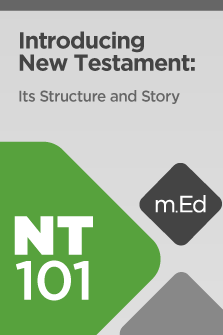
NT101 Introducing New Testament: Its Structure and Story
Published: 2014
Video Hours: 6
NT101 provides a survey of the New Testament beginning with the Gospels and ending with the book of Revelation. It provides a brief overview of the historical situation of the New Testament and the early Church, examines the overall life of Jesus, looks at the different writing techniques of the Gospel authors, and provides an overview of the Synoptic problem. NT101 also looks at the important developments in the early Church, including Paul’s conversion. The course surveys each of the New Testament Epistles, looking at the setting, structure, and major themes, and discusses the message and genre of the book of Revelation.

Professor:
Dr. Lynn Cohick
PhD, University of Pennsylvania

NT211 Introducing the Gospels and Acts: Their Background, Nature, and Purpose
Published: 2014
Video Hours: 6
NT211 walks through the pivotal events of history that shaped the social, religious, and political environment of Jesus and the early Church. It examines the nature of the Gospels, explores why the religious leaders opposed Jesus, demonstrates the significance of the resurrection, and discusses key events in the life of the early Church.

Professor:
Dr. Darrell L. Bock
PhD, University of Aberdeen; ThM, Dallas Theological Seminary
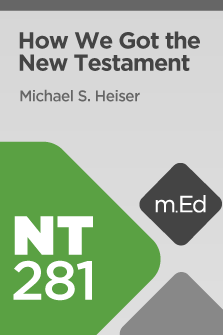
NT281 How We Got the New Testament
Published: 2014
Video Hours: 4
NT281 examines the history of the New Testament text from its inspiration to the discovery and transmission of manuscripts to the use of these manuscripts in modern English translations. It explores the role of scribes in the transmission process and discusses significant Greek New Testament manuscripts upon which modern translations are based. Also included is a discussion of translation philosophies and controversies.

Professor:
Dr. Michael S. Heiser
PhD, University of Wisconsin-Madison; MA, University of Wisconsin-Madison; MA, University of Pennsylvania
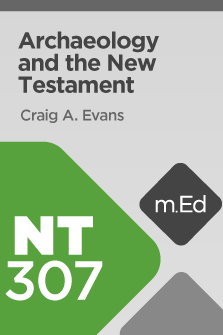
NT307 Archaeology and the New Testament
Published: 2015
Video Hours: 5
NT307 presents the tasks of archaeology and reviews the contributions made to archaeology by other physical and social sciences through their examination of recovered material culture. Findings from archaeology that support the claims of Scripture debunk popular theories that conflict with the biblical accounts and place Jesus within his historic cultural setting are presented. Particular attention to archaeological evidence regarding synagogues, Jewish beliefs regarding death, and Jewish burial customs is given, supporting the Gospel accounts of Jesus’ synagogue ministry, burial, and resurrection.

Professor:
Dr. Craig A. Evans
DHabil, Karoli Gaspar Reformatus University; PhD, Claremont Graduate University; MA, Claremont Graduate University; MDiv, Western Baptist Seminary
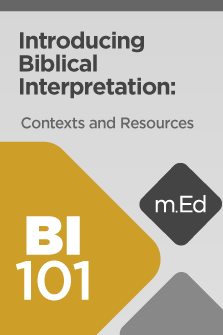
BI101 Introducing Biblical Interpretation: Contexts and Resources
Published: 2014
Video Hours: 5
Introducing Biblical Interpretation: Contexts and Resources (BI101) provides an introduction to the science and art of Bible interpretation, focusing on the importance of interpreting the Bible in its original ancient contexts. These contexts include the biblical writers’ ancient worldview, historical circumstances, cultural and religious beliefs, attitudes of their day, literary genre, and the original languages of the Bible. The course aims to foster an awareness of these contexts, all of which require competence for correct interpretation. Students are introduced to tools for developing competence in all these areas.

Professor:
Dr. Michael S. Heiser
PhD, University of Wisconsin-Madison; MA, University of Wisconsin-Madison; MA, University of Pennsylvania
Courses - Intermediate
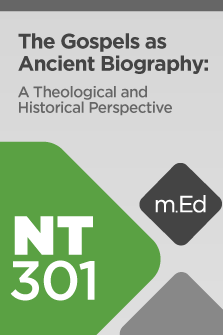
NT301 The Gospels as Ancient Biography: A Theological and Historical
Published: 2015
Video Hours: 4
NT301 discusses how to interpret the Gospels based on their genre rather than focusing only on their content. This course examines the four Gospels as ancient biographies and shows how a literary reading of the Gospels reveals the beauty of Jesus’ life.

Professor:
Dr. Jonathan T. Pennington
PhD, University of St. Andrews; MDiv, Trinity Evangelical Divinity School
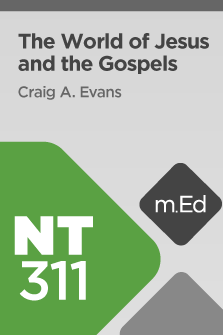
NT311 The World of Jesus and the Gospels
Published: 2015
Video Hours: 3
NT311 examines the intertestamental period. The decline of the Persian Empire, the rise of Alexander the Great, Israel’s military engagements and religious movements—the events between the final book of the Old Testament and the first Gospel are a backdrop for Christ’s appearance and the development of Christianity. Intertestamental history clarifies the context of the New Testament for a deeper, more robust understanding of Scripture.

Professor:
Dr. Craig A. Evans
DHabil, Karoli Gaspar Reformatus University; PhD, Claremont Graduate University; MA, Claremont Graduate University; MDiv, Western Baptist Seminary
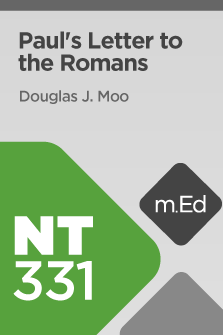
NT331 Book Study: Paul’s Letter to the Romans
Published: 2014
Video Hours: 10
NT331 surveys Paul’s letter to the Romans, tracing major theological themes. The course focuses on Paul’s flow of thought as he presents his arguments in Romans. It covers essential historical and theological backgrounds with an emphasis on engaging and examining traditional interpretations and newer ideas introduced by the New Perspective on Paul.

Professor:
Dr. Douglas J. Moo
PhD, University of St. Andrews; MDiv, Trinity Evangelical Divinity School
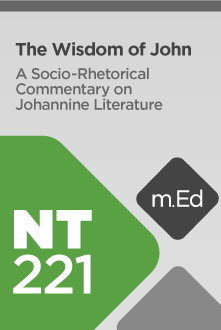
NT221 The Wisdom of John: A Socio-Rhetorical Commentary on Johannine Literature
Published: 2014
Video Hours: 13
NT221 examines the Johannine corpus: the Gospel of John, the epistles of John (1–3 John), and the book of Revelation. It considers elements of the Johannine style, as well as how Jewish Wisdom literature influenced the Gospel of John and 1 John. An analysis of the author, genre, and social setting of each book leads into a chapter-by-chapter exposition that reveals the meaning of the text.

Professor:
Dr. Ben Witherington III
PhD, University of Durham; MDiv, Gordon-Conwell Theological Seminary
Courses - Advanced
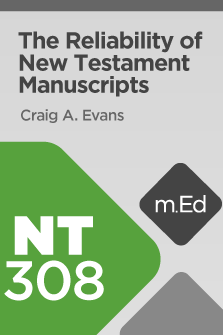
NT308 The Reliability of New Testament Manuscripts
Published: 2015
Video Hours: 1
NT308 answers a question commonly asked about the New Testament: Can we trust the manuscript record? This course clearly outlines the history of these important documents. It discusses the quality, quantity, and age of the manuscripts and how these elements compare to extrabiblical ancient texts. The course describes the practices of ancient writers and scribes and provides numerous examples to show that the manuscripts of the New Testament are reliable.

Professor:
Dr. Craig A. Evans
DHabil, Karoli Gaspar Reformatus University; PhD, Claremont Graduate University; MA, Claremont Graduate University; MDiv, Western Baptist Seminary
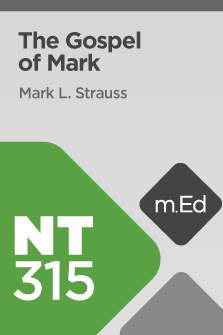
NT315 Book Study: The Gospel of Mark
Published: 2015
Video Hours: 8
NT315 provides an in-depth study of Mark’s Gospel. In this course, Dr. Strauss focuses on the words of Mark and the themes, theology, and purpose of the book. He describes the context of the Gospel as a whole and then examines the text passage by passage.

Professor:
Dr. Mark L. Strauss
PhD, University of Aberdeen, ThM, Talbot School of Theology; MDiv, Talbot School of Theology
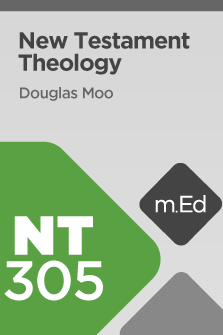
NT305 New Testament Theology
Published: 2014
Video Hours: 12
NT305 presents a unified perspective of the New Testament message, which emerges out of the New Testament’s various perspectives and genres. It begins by defining the discipline of biblical theology and describing its different approaches, and then it considers the message of the New Testament in terms of the “new realm”—entrance into it, the nature of life in it, its center, its people, and its consummation.

Professor:
Dr. Douglas J. Moo
PhD, University of St. Andrews; MDiv, Trinity Evangelical Divinity School
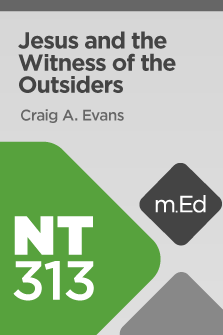
NT313 Jesus and the Witness of the Outsiders
Published: 2015
Video Hours: 1
NT313 explores various ancient sources that refer to Christ. It focuses on the evidence from extrabiblical sources and looks at what they reveal about the life of Christ and how Jesus was perceived by early non-Christian witnesses. It examines references to Jesus in Roman, Jewish, and other writings and looks at where Jesus’ name was invoked in both Christian and pagan charms and incantations.

Professor:
Dr. Craig A. Evans
DHabil, Karoli Gaspar Reformatus University; PhD, Claremont Graduate University; MA, Claremont Graduate University; MDiv, Western Baptist Seminary
Included Resources
Your program of study includes the selection of resources below, which are all used within the courses to expand upon and develop the concepts being taught.
-
Dictionary of Jesus and the Gospels NT101, NT211
-
Dictionary of New Testament Background NT211, NT307
-
The Origin of the Bible NT281
-
Jesus, the Final Days NT307
-
Dictionary of Paul and His Letters NT331, NT305
Syllabus & Learning Outcomes
Introduction
The New Testament Certificate Program includes courses on the background, content, and interpretation of the New Testament. In the foundational certificate program, you will be introduced to the story told in the New Testament, informed about where the New Testament came from (with a heavy emphasis on archaeology), and guided in your own interpretation of the text. The intermediate certificate program dives into the literary structure and cultural background of the Gospels. You will also focus on two major authors of the New Testament: Paul (in Romans) and John (in his corpus). The advanced certificate program gets into more specific topics like the New Testament manuscripts, New Testament theology, and the Gospel of Mark. With these courses you will learn to interpret, defend, and communicate the truths of the New Testament.
Purpose
The New Testament Certificate Program is designed to provide a foundation for New Testament studies for both professional and lay ministry. The courses will make the student an able interpreter of the New Testament. The knowledge and skills developed from completing these courses will not only transform the student’s personal interaction with the New Testament, but their communication of it to others.
Specific Outcomes
Knowledge-Based Foundational Outcomes
- Describe the historical, cultural, and social situation during the time of Second Temple Judaism, Jesus, and the early Church
- List the major themes, events, genres, and structure of the books of the New Testament
- Explain the interpretive issues involved in the book of Revelation
- Compare and contrast the canonical Gospels with the “missing gospels”
- Explain the issues of provenance and composition associated with each book of the New Testament
- Describe the concept of resurrection in Judaism and the Graeco-Roman world and its significance to the early Church
- Discuss the concepts of inspiration, inerrancy, canon, interpretation, and translation with respect to the New Testament
- Trace the transmission of the New Testament from its beginning to modern times
- Describe the nature of textual variants and the process of textual criticism
- Discuss the tasks of archaeology and the importance of Jewish burial practices to issues relating to the resurrection
- Offer archaeological evidence that refutes popular theories that Jesus survived the crucifixion, did not rise from the dead, and was married and fathered children
- Make use of academic resources pertaining to the interpretation of the New Testament
Knowledge-Based Intermediate Outcomes
- Explain the issues related to identifying the genre of the Gospels and analyze and critique how the Church has interpreted them throughout history
- Explain the relationship between the Gospels and other New Testament literature
- Interpret the Gospels with precision
- Summarize and illustrate how knowledge of the intertestamental period helps us understand the New Testament better
- Identify and characterize the key intertestamental written sources
- Recognize the structure and most important theological themes of Romans
- Identify the likely author, date, genre, and social setting of each Johannine book
- Explain the influence of outside literature on the books of the New Testament, specifically Johannine literature
- Describe the genre of apocalyptic literature and how it affects interpretation of Revelation
Knowledge-Based Advanced Outcomes
- Explain how the New Testament manuscript record compares to that of other ancient works
- Describe practices of ancient scribes and scholars that contributed to the longevity and quality of New Testament manuscripts
- Discuss and communicate the issues of provenance, structure, and theme of the Gospel of Mark
- Discuss the difficulties of the various endings to the book of Mark
- Define “biblical theology” and locate it within related disciplines
- Compare and contrast the old and new realms of salvation history
- Summarize the debate on the nature of justification in New Testament theology
- Describe elements of the New Testament perspective on Christian ethics
Skill-Based Foundational Outcomes Using Logos Bible Software
- Create and search custom collections in Logos Bible Software
- Identify Old Testament allusions in the New Testament
- Compare accounts in the narrative sections of the New Testament
- Perform morphological searches in the New Testament that lead to significant interpretive results
- Search for concepts and senses in the New Testament
- Find and analyze biblical maps
- Navigate through the Apocrypha, Pseudepigrapha, and Church Fathers
- Create extensive study guides on particular topics
- Analyze the writings of gnostic heretics
- Adeptly use a reverse interlinear and lexicons to study original languages
- Study a particular passage and develop accurate interpretation of that passage
- Find relevant events on a timeline and situate them in their historical context
- Find and observe ancient manuscripts
- Investigate issues of textual criticism
- Find relevant images and media for most any study topic and use them for teaching or preaching
- Conduct in-depth research of any biblical topic using journals and other resources
- Find and study English translations of ancient texts/primary sources
- Find online resources for biblical interpretation
Skill-Based Intermediate Outcomes Using Logos Bible Software
- Search for and identify genre coding in the New Testament
- Discover preaching/teaching illustrations related to the New Testament
- Perform narrative analysis
- Identify themes in a New Testament book and search for the same throughout the rest of Scripture
- Trace the history of the intertestamental period on a timeline
- Research specific personalities in history
- Organize and store New Testament research
- Use proximity searches to find relevant information for passages being studied
- Research extrabiblical Jewish literature
- Use a harmony of the Gospels resource to compare Gospel accounts
- Compare translations of New Testament texts
- Create custom visual filters for study of New Testament passages
- Measure distances on maps
Skill-Based Advanced Outcomes Using Logos Bible Software
- Access and share New Testament manuscripts
- Research manuscript issues in the works of the Church fathers
- Navigate the textual apparatus of the Greek New Testament
- Understand and use literary typing for complex searches
- Understand and use the Lexham Discourse Greek New Testament
